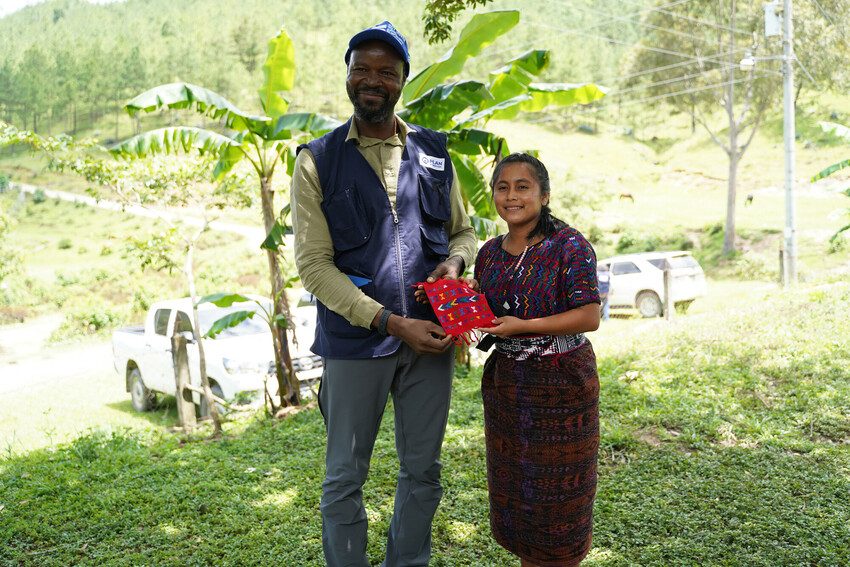Why girls’ fundamental rights are on the ballot this year
27 February 2024In this critical year of elections girls' fundamental rights are under threat, writes Plan International CEO Stephen Omollo. We must not let them be used as a bargaining chip.

Photo credit: Plan International.
Half the world’s population is going to the polls in 2024, which has rightly been billed as a super election year. In many ways this is exciting, as it reflects the march of progress where citizens across the world choose their leaders in a festival of democracy. Yet this coincides with some disturbing trends which we, as humanitarians, must call out, whilst maintaining our political neutrality.
The World Economic Forum recently shared the stark reality that gender equality is 131 years away. As the leader of Plan International, I see with my own eyes that adolescent girls all over the world are doing more than ever to advocate for their rights over their futures and their bodies. These voices are incredibly powerful – but we must also remember that girls are on the frontline of a battle to protect what progress we have seen. They are too often caught in what we often trivialise under the label of ‘culture wars’ but which have very real consequences for their lives.
For example, Zaidu, who is now 22 years old and from Nigeria, faced an incident of severe sexual violence four years ago when she was just 18. Since then, she has been tirelessly campaigning to help other girls and young women to protect themselves and seek support. She has run seminars in secondary schools on sexual abuse and its effect on mental health and is now organising walks against sexual harassment. The theme of these walks is ‘refusing to stay silent’, and this is having great resonance with girls and young women throughout the country.
Essential services are under threat
Zaidu is fighting injustice through education. But elsewhere, rights such as comprehensive sexuality education, and free sexual and reproductive health services that meet the needs of adolescents and young people are under threat. Political leaders searching for votes in this festival of democracy must desist from using the rights of girls and other vulnerable people to win elections.
As humanitarians, we uphold that rights are universal. It is heartbreaking that there are countries which robustly promote the rights of their own LGBTQIA+ citizens whilst demonising asylum seekers. Conversely there are countries which have welcomed millions of migrants from conflicts in neighbouring countries, showing great generosity, yet criminalise LGBTQIA+ people simply because of who they love.
There have been attacks on rights around the world on issues such as safe abortions, LGBTIQ+ rights, and comprehensive sexuality education, but this is not a fixed picture and many attacks on rights are opportunistic in order to achieve short term political objectives. As civil society organisations, it is critical that just as we reject harmful practices such as female genital mutilation, we reject the argument that universal rights contradict local cultures.
Civil society organisations which stand up for the rights of the vulnerable are being impeded through placing disproportionate reporting, compliance, and even taxation requirements in an attempt to stop us operating effectively. We have seen this play out in several countries, but as humanitarians we must always strive to overcome obstacles to support the most vulnerable, even where it becomes increasingly difficult to operate.
Religious and community leaders are critical allies
Sadly, certain ultra-conservative religious groups and denominations are also part of the anti-rights cause and often work hand in glove with political leaders. It is vital that we work with progressive elements in religious communities to support the protection of rights. Religious and community leaders are critical allies in promoting rights, which we have seen in the communities where we work, as we have a shared interest in supporting vulnerable people.
We must also look to transfer power to citizens, especially to girls and young people. This means working with local and youth led organisations that defend rights and showing solidarity in whatever form is most helpful to them. We must do all we can to get flexible funding to these organisations and ask donors to do the same, as this will play a crucial role in protecting a free civil society.
More than ever before, we need unity with all partners willing to defend rights including the United Nations, donors, media, and civil society organisations, large and small. We must show solidarity with citizens fighting for their rights in this critical year for democracy and the world, including girls and young women who have shown tremendous bravery in speaking out. Only through such a unity of purpose and commitment will we protect rights that mean so much to the most vulnerable around the world.


